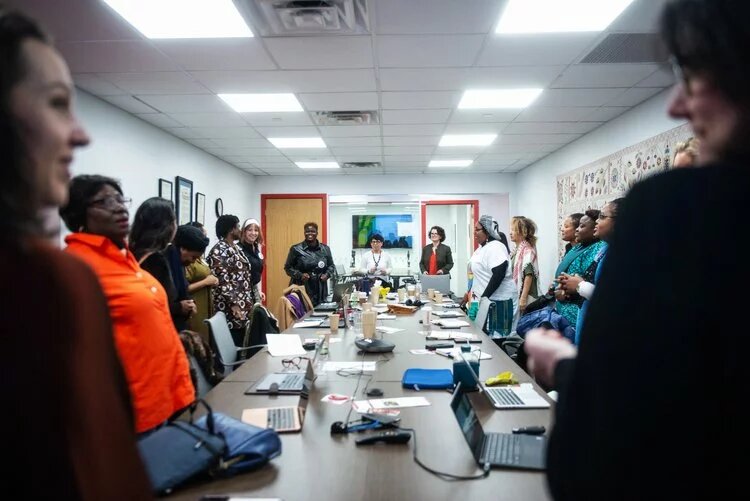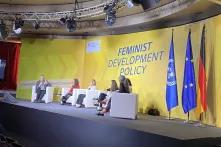
The current humanitarian system is failing. This system excludes, overlooks, and underfunds those on the frontlines — local feminist and Women’s Rights Organizations. It’s time to shift power and invest in a feminist humanitarian system.

Humanitarian crises are escalating in frequency and scale driven by climate change, geopolitical tensions, atrocities, and structural injustices at both global and national levels, impacting 180.5 million people across 72 countries. Yet the impact is far from equal. Women, children, people of diverse sexual orientations and gender identities and persons with disabilities face disproportionate impacts of heightened violence, growing inequalities, and limited access to support. The current humanitarian system is failing. Rooted in and perpetuating structural inequalities of racism, patriarchy, colonialism, and neoliberalism, it exacerbates crises instead of addressing them. This system excludes, overlooks, and underfunds those on the frontlines — local feminist and Women’s Rights Organizations (WROs). But we can and must change this. Increasingly, organisations representing marginalised groups are working together, using a feminist approach, to overcome injustices and respond to emergencies at the community, national, regional, and global levels.
Feminist leadership in the humanitarian system is the radical shift we need. Understanding how gender, race, class, and other social factors intersect to shape experiences of oppression and privilege, it centres those most affected, dismantles systemic inequality, and builds lasting resilience for more inclusive and sustainable outcomes.
Women Are on the Frontlines of Crisis
During the 68th Commission on the Status of Women (CSW68) in New York, WROs of the Feminist Humanitarian Network (FHN), in partnership with Heinrich Böll Foundation, came together to shape a powerful advocacy agenda for a feminist humanitarian system. The FHN is a global collective of 90 members from 35 countries, led by grassroots and national women’s rights organisations from the Global South, working to transform the humanitarian system into one guided by feminist principles, prioritising gender justice, inclusivity, and shifting problematic power dynamics.
In a world where complex crises are rolling back hard-won gender rights, from rising political extremism to profit-driven systems that dehumanise, diverse women’s voices are more crucial than ever. The climate crisis, economic inequalities, and ongoing backlash against the rights of women, girls, and gender-diverse people threaten to erase decades of progress.
But as crises grow, so does the movement for feminist-driven change, with WROs leading the way in rethinking humanitarian response. The thoughts and messages below emerged from events led by FHN members at CSW.
Crises Are a Catalyst for Change
Presenting opportunities to "build back better" crises can be catalysts for change. At the heart of every major humanitarian effort are grassroots, national feminist and WROs, who unlike large international non-governmental organisations (INGOs), are deeply embedded in their communities and committed to long-term, sustainable change. They aren’t just there for the immediate response; they’re in it for the long haul. Yet, despite their long-evidenced role they currently only receive a meagre 3.1 percent of gender-specific humanitarian funding. Why are the most effective, resilient organisations the least funded? Because of outdated, risk-averse funding models that stifle innovation and dismiss local expertise in favour of Global North-based organisations.
Redefining Risk: A Feminist Approach to Funding
Funding is tied to “risk” in ways that reinforce colonial power structures. Donors and large INGOs see themselves as watchdogs to prevent risk and impose restrictive, paternalistic requirements on grassroots partners. Accountability is one-sided, with WROs relegated to “implementing partners” without transparency around partnership costs, undermining their vital role in providing gender-specific services during emergencies. WROs are on the frontlines of crisis response, yet they often operate on shoestring budgets, struggle to meet basic costs and take immense risks to reach those in need. This is partly due to their inability to meet rigid due diligence requirements set by donors and international actors. The prevailing view assumes that WROs working at the grassroots and national levels lack the capacity or trustworthiness to manage funds. This exclusionary, top-down approach places the burden of compliance on local partners, stifling innovation and marginalising their voices in decision-making. It limits access to critical funding, putting WROs under immense pressure during crises. With already limited resources, including insufficient staff to navigate complex application and reporting processes, they are often forced to jump through bureaucratic hoops to secure emergency funds, delaying their ability to respond effectively when communities need them most. Despite this, WROs continue to deliver innovative solutions that uphold women’s and gender-diverse people’s human rights.
Donors and international actors need to realise that the greatest risk is in failing to meaningfully invest in feminist organisations that are driving the transformational change required to reshape the humanitarian landscape. Despite many INGOs, humanitarian stakeholders, and donors claiming to be ‘feminist’, risk models remain anything but. The FHN is challenging these outdated frameworks, to decolonise and establish a feminist funding model that centres accountability to women, their organisations, and communities. We must radically rethink funding to ensure resources are flexible, accessible, and long-term. Investing in WROs not only strengthens crisis response but lays the groundwork for lasting social change.
We must build towards a feminist humanitarian system that is inclusive, intersectional, and driven by those it serves.
Building Power Through Feminist Networks
Forming powerful alliances, feminist organisations and individuals are making change happen. By pooling resources and sharing expertise, these networks amplify their reach and strengthen the impact of each member. Funding feminist networks means donors can reach more communities and see a far greater impact for each dollar invested, without leaving anyone behind.
Feminist funding models are urgently needed to support these networks, but the numbers are grim. While humanitarian funding has doubled since 2012, a staggering portion still needs to reach those it targets. Less than 50 percent of people in need receive aid and the amount of gender-specific funding directly reaching local and national actors has significantly decreased in recent years. If funding continues to decline, it is not just WROs that suffer but entire communities, with far-reaching consequences for women’s rights globally.
We must build towards a feminist humanitarian system that is inclusive, intersectional, and driven by those it serves. Unlike traditional humanitarian approaches, it actively confronts power imbalances, upholds the rights of women, girls, and sexual and gender-diverse people, and ensures accountability and transparency in every decision.
A Call for Feminist Transformation in the Humanitarian System
- Fund WROs directly and flexibly: Humanitarian funding must go directly to local and national WROs and feminist networks, with quality, flexible funding that ensures long-term sustainability and capacity building.
- Adopt a feminist approach to risk: Redefine risk models to centre accountability to WROs and their communities, moving away from exclusionary, top-down due diligence processes. Global South-based WROs must be trusted as equal partners in decision-making.
- Transform the humanitarian system: Embed feminist principles of intersectionality, inclusivity, transparency, and power-shifting in humanitarian responses to address the structural inequities of racism, patriarchy, colonialism, and neoliberalism.
- Recognise and resource WRO leadership: Support WRO-led consortiums, allow WROs to set priorities, and provide technical expertise under their leadership.
- Invest in feminist networks for collective impact: Provide multi-year funding to feminist networks and coalitions to enable coordinated, systemic responses.
- Ensure gender justice in crisis response: Prioritize combating gender-based violence and upholding the rights of women, girls, and gender-diverse people in emergencies.
- Increase accountability and transparency: Commit to equitable partnerships where WROs influence resource allocation and partnership costs are transparent.
- Leverage crises as opportunities for transformation: Use humanitarian crises as moments to “build back better,” strengthening WROs’ efforts to achieve gender justice and lasting change.
The Future Is Feminist and It Is Already Taking Shape
The stakes have never been higher. As climate disasters, political upheavals, and conflicts intensify, feminist leadership is proving essential to transforming humanitarian response. WROs and feminist networks aren’t waiting for change, they are creating it, driving ground-up solutions and ensuring the voices of the most affected are heard and acted upon. The world cannot afford to ignore their impact. The time for passive rhetoric is over. We need bold action to dismantle oppressive systems that have harmed us for centuries. Demand a feminist humanitarian system. Fight for accountability. Stand up for gender justice. A world built on equality and respect is possible, but only if we demand it now. Feminist-led humanitarian action is not optional; it is the only pathway to a just, inclusive, and effective humanitarian system.


